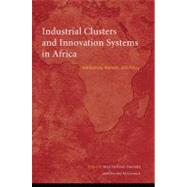
Note: Supplemental materials are not guaranteed with Rental or Used book purchases.
Purchase Benefits
What is included with this book?
| List of figures | p. vii |
| List of tables | p. viii |
| List of contributors | p. x |
| Preface | p. xii |
| Acknowledgements | p. xiii |
| Introduction: Clusters and innovation systems in Africa | p. 1 |
| Industrialization through cluster upgrading: Theoretical perspectives | p. 20 |
| From clusters to innovation systems in traditional industries | p. 39 |
| Industrializing Kenya: Building the productive capacity of micro and small enterprise clusters | p. 63 |
| Small and micro enterprise clusters in Tanzania: Can they generate industrial dynamism? | p. 81 |
| Learning in local systems and global links: The Otigba computer hardware cluster in Nigeria | p. 100 |
| Power and firms' learning in the Egyptian furniture cluster of Domiatt | p. 132 |
| Learning to change: Why the fish processing clusters in Uganda learned to upgrade | p. 158 |
| The Durban Auto Cluster: Global competition, collective efficiency and local development | p. 189 |
| Global markets and local responses: The changing institutions in the Lake Victoria fish cluster | p. 211 |
| Government support and enabling environment for inter-firm cluster cooperation: Policy lessons from South Africa | p. 243 |
| Institutional support for collective ICT learning: Cluster development in Kenya and Ghana | p. 269 |
| Conclusion and policy implications | p. 294 |
| Index | p. 310 |
| Table of Contents provided by Ingram. All Rights Reserved. |
The New copy of this book will include any supplemental materials advertised. Please check the title of the book to determine if it should include any access cards, study guides, lab manuals, CDs, etc.
The Used, Rental and eBook copies of this book are not guaranteed to include any supplemental materials. Typically, only the book itself is included. This is true even if the title states it includes any access cards, study guides, lab manuals, CDs, etc.